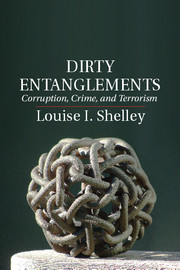Book contents
- Frontmatter
- Dedication
- Contents
- Figure, Maps, and Tables
- Acknowledgments
- Introduction
- Part I The Logic of Corruption, Crime, and Terrorism
- Part II The Diverse Businesses of Terrorism
- 5 The Business of Terrorism and Criminal Financing of Terrorism
- 6 The Drug Trade
- 7 The Less Policed Illicit Trade
- 8 Ultimate Fears
- Conclusion
- Index
- References
Conclusion
Published online by Cambridge University Press: 05 August 2014
- Frontmatter
- Dedication
- Contents
- Figure, Maps, and Tables
- Acknowledgments
- Introduction
- Part I The Logic of Corruption, Crime, and Terrorism
- Part II The Diverse Businesses of Terrorism
- 5 The Business of Terrorism and Criminal Financing of Terrorism
- 6 The Drug Trade
- 7 The Less Policed Illicit Trade
- 8 Ultimate Fears
- Conclusion
- Index
- References
Summary
From Fiction to Present-Day Reality
Decades before policy makers ever considered the crime-terror phenomenon, Ian Fleming, in his 1961 novel Thunderball, dreamed up SPECTRE (Special Executive for Counter-intelligence, Terrorism, Revenge, and Extortion), a supranational profit-making organization. In the James Bond film Dr. No, Joseph Wiseman, archly playing the eponymous villain from SPECTRE, explains that his network does not represent the Soviet bloc, then the primary security concern of that period. Rather, the SPECTRE agent explains, they are not confined to a single region but represent the four cornerstones of power run by the world’s greatest minds.
Today, there is no actual SPECTRE, a unified organization spanning continents that blends terror and criminal acts. Yet, much as Ian Fleming imagined, the interrelationship of crime and terrorism is a critical global security challenge, commanding attention at the highest levels of national and multinational governance.
The actual problem is even more complex than its fictional precedent. Unlike in the Bond films, it is no longer possible to vanquish a single evil organization like SPECTRE to rid the world of crime and terror. The links between crime and terrorism are global, networked, and interrelated. The problem is like a cancer, constantly mutating and reappearing in new places. It operates not unlike the quantum entanglements of the physical world, where changes in one locale produce profound changes far from the original source.
- Type
- Chapter
- Information
- Dirty EntanglementsCorruption, Crime, and Terrorism, pp. 320 - 352Publisher: Cambridge University PressPrint publication year: 2014



